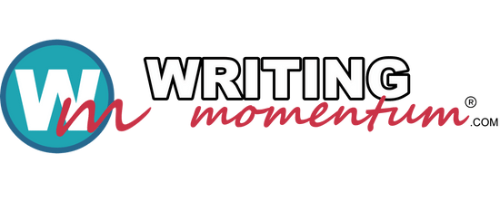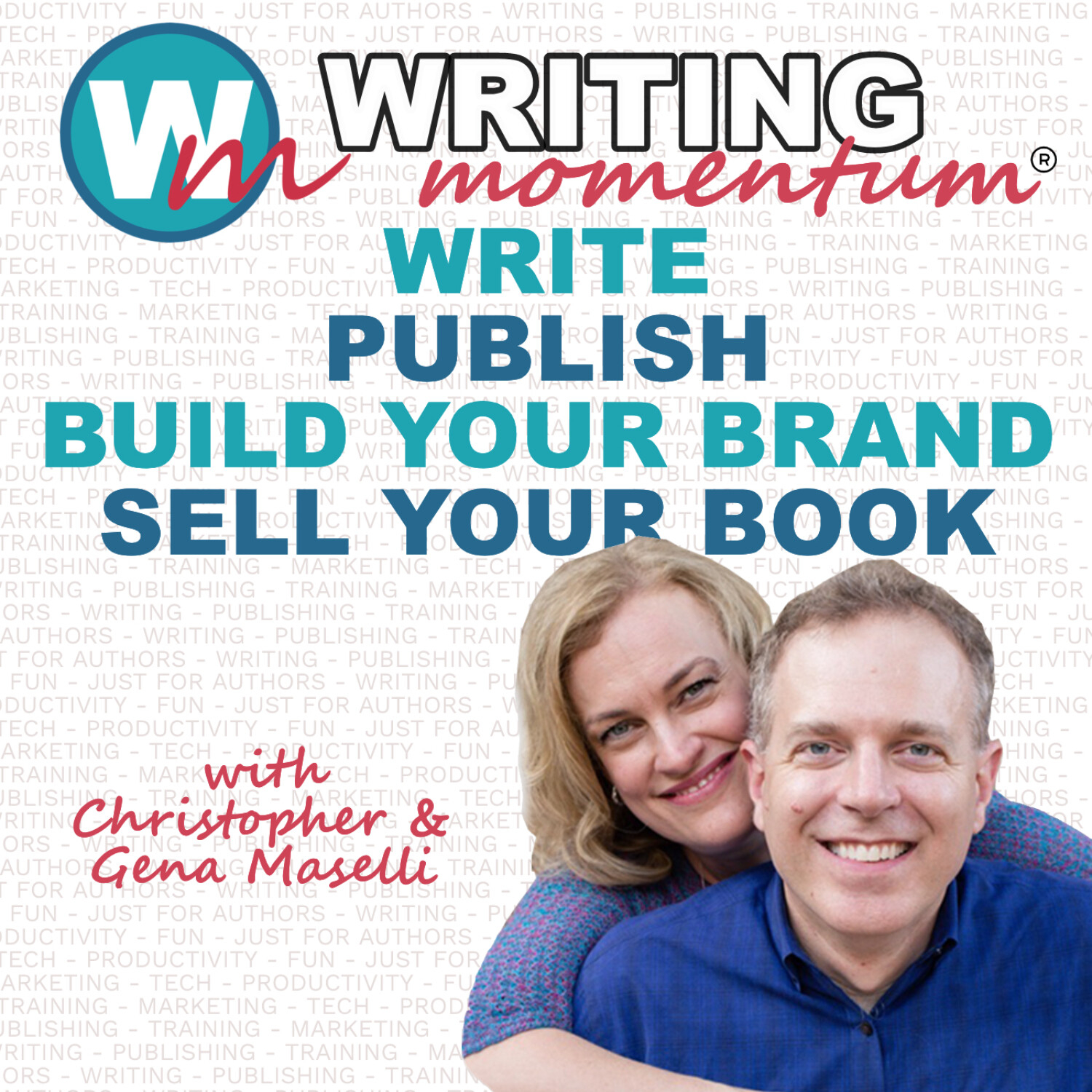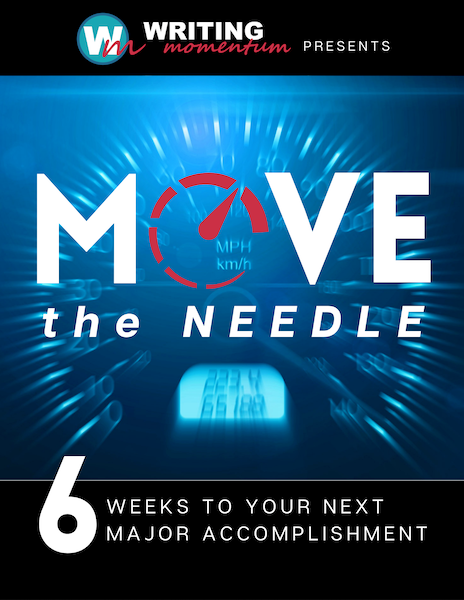Episode 94
Unlocking Author Power: Embracing the Freedom of Choosing How to Publish
In this episode of the Writing Momentum podcast, Chris and Gena are joined by bestselling author William Bernhardt to discuss the pros and cons of traditional versus independent publishing, also known as self-publishing. They explore the evolution of the publishing industry and how the internet has created more opportunities for authors to reach their audience. Bernhardt shares his insights on the stigma that once surrounded self-publishing and how it has changed over time. He also discusses the importance of book quality and promotion, regardless of the publishing path you choose.
Links:
- The Florentine Poet by William Bernhardt - https://amzn.to/475K1ak
- WriterCon - Labor Day Weekend - https://www.writercon.com
- Liz Wilcox's Email Marketing Membership at http://wmdeal.com/liz
- Get your FREE Move the Needle goal-setting for authors ebook at https://www.writingmomentum.com
- Write with us! Join Chris, Gena, and Rene each Wednesday at noon Central and let's get our writing DONE! https://www.writingmoments.com
Transcript
Hello and welcome to the Writing Momentum Podcast.
Speaker:I'm Christopher Maselli.
Speaker:I'm here with my wife Gena.
Speaker:Hello.
Speaker:How you doing Gena?
Speaker:I'm doing really well.
Speaker:Oh, hey, we have something special today.
Speaker:Very special.
Speaker:Yeah.
Speaker:William Bernhardt is back.
Speaker:How's it going, Bill?
Speaker:Doing great.
Speaker:Good to see you two.
Speaker:Oh, so glad to have you here.
Speaker:So for those of you who don't know, Bill, he is the bestselling author of
Speaker:more than 60 books, including Shameless, the Daniel Pike Legal Thrillers, two
Speaker:Historical novels, two books of Poetry, 10 books in the Red Sneaker Writing series.
Speaker:And he is also the host of the WriterCon podcast, which is another
Speaker:great podcast you should listen to.
Speaker:Subscribe today.
Speaker:And he's the co-host of the WriterCon Writer's Conference, which is in
Speaker:Oklahoma City over Labor Day weekend.
Speaker:Everyone should come, shouldn't they?
Speaker:Yeah, absolutely.
Speaker:It's a great conference.
Speaker:I think every it gets bigger and yet somehow correspondingly more intimate
Speaker:every year, I think, because everybody is so tight and supportive of other people's
Speaker:writing, because we've all been there.
Speaker:You've heard the cliche that writing is the loneliest profession, but it
Speaker:doesn't have to be, granted, when you're actually writing, you're probably not
Speaker:in a big, although I've written a lot of chapters at the mall while my kids
Speaker:were doing other things or what other, but usually, sure that part's alone.
Speaker:But on the other hand, writing and publishing has given me the
Speaker:opportunity to go places and meet people I never would've met.
Speaker:And to me, WriterCon is like the epitome of that.
Speaker:'cause we get so many people, so many writers who even if you know
Speaker:them, you tend to not get together unless there's some event, right?
Speaker:And so it's a great occasion.
Speaker:Yeah.
Speaker:And it's on every year over Labor Day weekend.
Speaker:So be sure you attend next year, because you will grow from year to year and
Speaker:just really take so much away from it.
Speaker:It's so good.
Speaker:And we did a deep dive into WriterCon in an earlier episode, but today we're gonna
Speaker:talk about something that we get asked, and I'm sure Bill gets asked all the time.
Speaker:About the pros and cons of traditional versus independent publishing,
Speaker:self-publishing, and with today's world and today's the publishing industry
Speaker:changing so fast, it's a valid question.
Speaker:And you have been both, traditionally and self-published.
Speaker:And a few other things.
Speaker:Yes.
Speaker:A few other options.
Speaker:Yeah.
Speaker:Yeah, tell us about that.
Speaker:Tell us about, because you've been in this industry for a while, so
Speaker:you've seen it change so much.
Speaker:So can you talk about how that has changed, how we've gone from traditional
Speaker:to now there being this choice?
Speaker:Yeah.
Speaker:Let me say two things right up front.
Speaker:If you think I'm gonna tell you what you should do, you're wrong because that's
Speaker:a choice and there's no right answer.
Speaker:It's just one.
Speaker:What's gonna make you feel happy as a writer.
Speaker:And two, what kind of book are you writing?
Speaker:Those are the touchstones for which way you want to go.
Speaker:But the other thing I'll say is that if as some people, including
Speaker:me, would've thought at one point, self-publishing, that's a dead end.
Speaker:That's never gonna go any that's not necessarily true anymore.
Speaker:It was once upon a time, like Gena was saying.
Speaker:And I first was trying to get published in the eighties.
Speaker:My first book was published in 91, but at that time, There's only one game in town.
Speaker:Because books were sold far and away, primarily in bookstores.
Speaker:And to get into the bookstore, you had to have a publisher, preferably
Speaker:a larger one, and the only way to get a publisher was to have an agent.
Speaker:There was one path basically, and one that the publisher's gonna keep most of
Speaker:the money and then the agent's gonna take a piece of what you're supposed to get.
Speaker:And sometimes even writers whose books are selling weren't being
Speaker:compensated the way I think they should.
Speaker:But I've got some prejudice here 'cause I am a writer and
Speaker:writers are my favorite people.
Speaker:And I think historically writers have always gotten the short into
Speaker:the stick in the publishing world.
Speaker:And what sense does that make?
Speaker:What would the book industry be without authors?
Speaker:We should be the most important players, not the people getting
Speaker:the table scraps, right?
Speaker:So I have no opposition whatsoever to alternative paths, and that's
Speaker:why I love what's happening now with independent publishing, which we're
Speaker:really talking about self-publishing.
Speaker:Just to clarify, 'cause again, back in the day, independent publishing meant
Speaker:not in New York, a smaller publishing out the regional university press,
Speaker:but now people usually use it to mean self-publishing, which of course can be
Speaker:done and a lot of people are doing it.
Speaker:Does everybody get rich doing it?
Speaker:No.
Speaker:But there are some real success stories.
Speaker:And you know the reality is most time what matters is first, how good is your book?
Speaker:And two, of course, how good is the promotion.
Speaker:Because if nobody has heard about your book, then they can't buy it.
Speaker:And if you're self-publishing, Guess who's in charge of all that?
Speaker:All the promotion and really for that matter, everything, title,
Speaker:cover, design, distribution.
Speaker:It's you.
Speaker:One of my favorite quotes from Lori Lesko is that the I won't get it exactly
Speaker:right, but it's basically the good thing about self-publishing is that you get
Speaker:to make all the decisions yourself.
Speaker:The bad thing about self-publishing is you have to make all the decisions
Speaker:yourself and learn how to do things.
Speaker:Yeah, that's really true.
Speaker:Some of what you're talking about, there was barriers to entry there,
Speaker:there used to be a huge barrier to entry if you wanted to self-publish.
Speaker:And even traditionally publish, there's a bit of a barrier to entry.
Speaker:'cause you had to get an agent to want your material and then you have to get
Speaker:an editor to wanted that sort of thing.
Speaker:Yeah, it's always hard to get into bookstores, and even being traditionally
Speaker:published is absolutely no guarantee that you'll get in bookstores.
Speaker:But your odds are better.
Speaker:Whereas in the past, there was no chance a self-published book would get in
Speaker:bookstores or very little, maybe your local one, but nobody else, and, and
Speaker:so how could you effectively sell them?
Speaker:But that has changed with the internet.
Speaker:Yes the internet makes it so that you don't have to rely on
Speaker:bookstores for distribution.
Speaker:You can have them online and it can be available to mass audiences
Speaker:then, but the quality too, right?
Speaker:I started getting published back in the nineties and if you self-published
Speaker:a book back then, unless you spend a lot of money, it would look.
Speaker:What I like to call self-published, right?
Speaker:It looked like someone just created it themselves.
Speaker:It didn't look the same as those really pretty books on the shelf.
Speaker:And people do judge a book by its cover, right?
Speaker:And unfortunately and because of that you could tell, it's
Speaker:almost like it had a stigma.
Speaker:I think self-publishing did.
Speaker:Oh, definitely a stigma.
Speaker:It did.
Speaker:There's no question about it.
Speaker:Yeah, and I'm not sure that completely eroded now.
Speaker:It probably depends on where you are.
Speaker:If you're a, writer at the faculty lounge.
Speaker:It might be a different response all it really took is one person.
Speaker:To be financially successful with self-publishing and then the
Speaker:walls start coming down, right?
Speaker:Yes.
Speaker:And the channels to be opened up, and the technology to come around.
Speaker:And when those things happened, it just, it made everything so much easier.
Speaker:And I think there's also, as you mentioned about how the writer or
Speaker:the author was at such a, somewhat of a disadvantage financially for so
Speaker:long, that as these books became more.
Speaker:It became more possible to make a good amount off of the sales of a
Speaker:book that writers started to question.
Speaker:Maybe I don't need to do this, maybe I can do this myself.
Speaker:So what, talking about, I guess we've really covered some of the pros and
Speaker:cons with traditional publishing.
Speaker:We've talked about how, it's easier maybe to get in some of the bookstores, but
Speaker:even that has somewhat changed, hasn't it?
Speaker:Because with Amazon there's no guarantee.
Speaker:And with so many book stores going outta business or changing their model.
Speaker:I've walked into some Barnes and Noble and most of it is gift
Speaker:books anymore, and gift products.
Speaker:So not even really books anymore.
Speaker:So being a big author booster, I'm glad we have more paths
Speaker:and really these are only two.
Speaker:There are people who are selling books from their website.
Speaker:There are people who are crowdfunding, Kickstarter or whatnot, to finance
Speaker:book publishing, Brandon Sanderson being the obvious $40 million example.
Speaker:But there are other people who have done it successfully on a more modest scale.
Speaker:There are people who are using Wattpad.
Speaker:Or social media like Instagram.
Speaker:Or poetry is flourishing.
Speaker:TikTok, of course, has become a huge sponsor obviously of Colleen
Speaker:Hoover, but others as well.
Speaker:If you can get a TikTok influencer to get emotional about your book, right?
Speaker:That goes all over TikTok and boom, you've got, Barnes and Noble typically
Speaker:has a table now that says book talk books or something like that, because
Speaker:people are seeing that, people have got their phones all the time.
Speaker:And so they're looking and reading and scanning, and I just wish more
Speaker:of that time was spent looking at books instead of all that other
Speaker:stuff and Barbie memes and whatnot.
Speaker:So what, I know you don't wanna recommend one path and we don't either,
Speaker:but what do you need to consider?
Speaker:To know which direction to go because we've just talked about how
Speaker:lower the barrier to entry is and how easy it is to self-publish it.
Speaker:May, people may be thinking that we're just saying, Hey, you should
Speaker:self-publish because it's so easy to do.
Speaker:And yet, of course the big red flag there is, Hey, you've also
Speaker:gotta market your own book, right?
Speaker:You still gotta sell it.
Speaker:But why would someone want to traditionally publish today?
Speaker:What are the benefits to that?
Speaker:The benefits of traditional are, probably already apparent.
Speaker:You got somebody else, some other people who theoretically know what they're doing.
Speaker:And make all the decisions and will.
Speaker:You may not even be consulted about the title or the cover art, or who
Speaker:gets the final cut and how it's promoted and that sort of thing.
Speaker:On the other hand, that's stuff that you don't have to do.
Speaker:So the good stuff is you know that you've got people who know what they're
Speaker:doing, you hope and may be able to get your book in the bookstores.
Speaker:The downside, of course, is that you've given up your rights because you only
Speaker:get that contract that deal by signing a contract in which you license those rights
Speaker:to a publisher, which realistically, in most cases, you're never gonna get back.
Speaker:Because now everything's perpetually published, right?
Speaker:It never goes outta print anymore.
Speaker:Nothing.
Speaker:If it's set up for print on demand or as an ebook that's not going out of print.
Speaker:You can try and get somebody to agree to a term clause, publishing for 10 years.
Speaker:But if you're a first time writer with no clout and they're a big New York
Speaker:company you're not gonna get that.
Speaker:They're not gonna give you anything.
Speaker:They're gonna say, take it or leave it.
Speaker:And if you leave it, then they got 600 other people who would also like
Speaker:to be published waiting in the wings.
Speaker:So you are not gonna be the control player.
Speaker:And that's a big thing, like I mentioned, my first book was published in 91.
Speaker:And at that time, they did audio books for my early books, but they were
Speaker:recorded on cassette tapes, which, some of your listeners may not even
Speaker:know what I'm talking about, but they were these analog strips of magnetic
Speaker:tape and it'd take about 12 of 'em.
Speaker:Obviously those aren't still available.
Speaker:And yet can I get the audio book rights back from Random House?
Speaker:Of course not.
Speaker:'cause the books are still in print.
Speaker:So even though those rights aren't being, even though it's money left on
Speaker:the table I can't get those rights back.
Speaker:And that's really for, I wish I had all the rights back.
Speaker:Let me self-publish.
Speaker:Because the author is obviously gonna pay more attention to it
Speaker:than a big company that's got 500 books coming out every month.
Speaker:So that's the plus and minus of traditional and independent.
Speaker:Of course, then you do get to make all the decisions, but that means
Speaker:you're gonna have to know what you're doing or it's not gonna turn out well.
Speaker:Gena was saying, a lot of people.
Speaker:Like maybe more than a million every year are gonna upload books to Amazon's
Speaker:K D P, Kindle Direct Publishing program.
Speaker:But most of those are not gonna be successful.
Speaker:To be fair.
Speaker:Most of those people are not, don't be offended, I'll use
Speaker:the word serious about it.
Speaker:They're not coming to conferences so that they know what they're doing.
Speaker:So there may be craft issues with their books and there's certainly gonna
Speaker:be issues in terms of presentation and distribution, publicity.
Speaker:If you're gonna go that route, you need to learn what you're doing.
Speaker:You need to come get some education.
Speaker:So why do it if it's not gonna be a success?
Speaker:Occasionally I hear people say, oh, I don't care if my book sells or not.
Speaker:And I just think, Really, everyone really does.
Speaker:It may not be live or death.
Speaker:You spent at least a year writing that book you really content
Speaker:to have nobody ever read it.
Speaker:I find that really hard to imagine.
Speaker:The reason I was saying before, I'm not gonna tell people which path
Speaker:to pick, is because first you gotta consider what's gonna make you happy.
Speaker:If you are not gonna feel validated as a writer, unless you have a big
Speaker:five publisher and a really slick looking hardcover that your mom
Speaker:can put out on her coffee table or whatever, then by gosh, pursue that.
Speaker:And then maybe if it doesn't pan out after a few years, you can try plan B.
Speaker:On the other hand, if you do have a more entrepreneurial spirit and you
Speaker:don't really care about the publisher, which, more and more, I don't think
Speaker:readers even notice these days.
Speaker:Because they're buying eBooks on Amazon.
Speaker:They'll notice the author and the plot description.
Speaker:They don't know who published it.
Speaker:They don't care who published it.
Speaker:They just want a good book.
Speaker:So if none of that matters, you can focus on publishing yourself,
Speaker:where obviously the profit margins are gonna be much larger.
Speaker:Of course, if you don't sell any, that's not gonna matter.
Speaker:But if you can get some sales going, 70% sounds a whole lot
Speaker:better than four to 15, right?
Speaker:Yes.
Speaker:Exactly.
Speaker:When we talk to authors, a lot of times they want to opt for the
Speaker:traditional route because they do not want to market their book, and they
Speaker:feel like, Hey, if I go that way, the publishers will help take care of that.
Speaker:What do you see nowadays?
Speaker:What is it like, is there hardly any marketing from the publishers
Speaker:nowadays, or is it just unless the book sells it's not marketed.
Speaker:Right.
Speaker:Precious little, it depends.
Speaker:But again, remember that the, say the Big five corporations as everybody
Speaker:know what I mean, the Big five, we call them New York publishers 'cause
Speaker:they have offices there, but all of them are owned by large multinational
Speaker:corporations, which are posited elsewhere.
Speaker:Only one of them is American owned.
Speaker:And so calling them New York companies is not entirely accurate, but
Speaker:now I've gotten off on a tangent.
Speaker:What was the question?
Speaker:What are we talking about here?
Speaker:Do they market their authors books, especially for new authors?
Speaker:Oh, marketing!
Speaker:Even when I started in 91, most books did not get much promotion,
Speaker:and it's even less so now.
Speaker:I'm not exaggerating when I say every quarter or so.
Speaker:A publishing house will put all their chips behind one book.
Speaker:Because they had to pay for it a lot in auction, or for whatever reason
Speaker:they think that might be the one.
Speaker:So they'll give it a little bit of promotion.
Speaker:Or if it's a legacy author, somebody they know is gonna sell.
Speaker:But for the most it's it's very little.
Speaker:And it's not because they don't wanna make money, it's because they really
Speaker:can't predict which books are gonna hit.
Speaker:And which aren't.
Speaker:It's is what in my lawyering days, we would talk about the spaghetti
Speaker:defense, meaning you just throw a lot of stuff on the wall and
Speaker:see what sticks with the jury.
Speaker:And it's the same thing here.
Speaker:They publish tons of books every month.
Speaker:90% of them lose money, but they're looking for the one big breakout.
Speaker:Where the Crawdads Sing, or whatever it's gonna be.
Speaker:That pays for everything else, but they don't know where that is, where that's
Speaker:gonna come from, at least initially.
Speaker:So they don't know where to put their money.
Speaker:Wow.
Speaker:And I think that is where we have said and Chris and I have really encouraged
Speaker:our listeners and viewers to really learn to one, see themselves as a
Speaker:business as a writer, they are a business and to promote their or to approach
Speaker:their writing with that business.
Speaker:And I know going back to WriterCon, we've talked before about
Speaker:WriterCon, I've just touched on it.
Speaker:But one of the things that I do love about Writer Con and whether it's Writer
Speaker:Con or another writer's conference is going and learning that marketing side.
Speaker:There are some pretty.
Speaker:Savvy marketers at these conferences that have come up
Speaker:with some pretty out of the box.
Speaker:They think out of the box of how to promote their books.
Speaker:For people who are looking to learn that side of it, I do think a writer's
Speaker:conference is a great way to go to learn how to market their books.
Speaker:'cause like you said, whether it's traditional or
Speaker:independent, it doesn't matter.
Speaker:You're gonna be responsible for it.
Speaker:It's all about education, right?
Speaker:And that's what I think is WriterCon really unique profile that I don't
Speaker:think is duplicated anywhere else.
Speaker:Yes, there are other lesser conferences.
Speaker:Did I really say that?
Speaker:Oh, you might have to flip that out, but I'm kidding.
Speaker:But what I think gives ours is who's putting it on?
Speaker:It's you two.
Speaker:It's me and Rene all experienced multi published authors who get around and we
Speaker:know what's going on and so we can and I'm not dissing other conferences, but most
Speaker:are not put on by bestselling authors, they're people who love books, but are
Speaker:not necessarily in that world and going to those events, they may not have the edge
Speaker:that we have in finding the best speakers.
Speaker:Or finding people who really know what's going on right now and
Speaker:can convey that to people so they can use it to their advantage.
Speaker:This is a very fast-paced and changing business, as you well know
Speaker:particularly in the last decades.
Speaker:And if you're coming into this with 1990 ideas about publishing, that's
Speaker:just not gonna work anymore 'cause that's not the world we live in.
Speaker:Yeah, that is absolutely true.
Speaker:Hey, speaking of publishing, we hear you've got a new book that's come out.
Speaker:Would you like to tell everyone a little bit about that?
Speaker:I think it's sitting behind you there.
Speaker:That's the hovering over my shoulder there.
Speaker:Yeah.
Speaker:Subtle product placement.
Speaker:But yeah, as you guys know my mainstay have been thrillers particularly
Speaker:legal thrillers, which have been very kind to me, but I thought I'd earned
Speaker:a chance to take a break from that.
Speaker:A book that I've been writing it off and on for 10 years, but I thought, okay, I'm
Speaker:gonna knuckle down and get this thing out.
Speaker:It's called the Florentine Poet.
Speaker:It's essentially a fable.
Speaker:It's fun and it may have some good takeaways.
Speaker:I heard a reviewer called it the Princess Bride for Literature Lovers,
Speaker:and I thought, oh, that's so good.
Speaker:I wish I thought of that.
Speaker:That's really good.
Speaker:Aren't you glad you tied that to your book though.
Speaker:That's great.
Speaker:I gotta get that on the back cover, but that's really true.
Speaker:It's got that kind of fable lightheartedness, but at the same time,
Speaker:it's a guy who wants nothing more to than to be a poet, and you can relate to that.
Speaker:And I, whether it's poetry or some other kind of writing.
Speaker:You understand that drive.
Speaker:Writers are usually people who just have to write, they want to
Speaker:write for some reason or another, and that's Pietro in the book.
Speaker:Plus the presentation is so good.
Speaker:A fellow named Carl Brune designed it and an illustrator named Brian
Speaker:Call, did these great illustrations.
Speaker:You can see one on the cover and they appear throughout the book is just
Speaker:the most beautiful package I've ever seen, and so I'm really proud of that.
Speaker:That's awesome.
Speaker:Excellent.
Speaker:That's gonna be, that's available on Amazon, I assume right now, as well
Speaker:as wherever good books are sold.
Speaker:Right?
Speaker:That's my story, yeah right.
Speaker:I hope so.
Speaker:Should be able to find it.
Speaker:We look forward to it.
Speaker:Awesome.
Speaker:Do you wanna close this out, Gena?
Speaker:We hope you have enjoyed this episode of the Writing Momentum Podcast with
Speaker:William Bernhardt and I am just, I'm really thankful that you've been here.
Speaker:I love this discussion about independent versus traditional publishing
Speaker:because it's just such a new world.
Speaker:And so if you've enjoyed this episode please rate, review, subscribe, and
Speaker:share it, especially with that person who's been questioning, do I wanna be
Speaker:traditionally or independently published?
Speaker:But, thank you Bill.
Speaker:Thank you so much for being here with us.
Speaker:We will see you at the next WriterCon, so exciting and what
Speaker:do you say, Chris, together what?
Speaker:Don't forget that together we have writing momentum.
Speaker:Bye-bye.
Speaker:See you guys.





